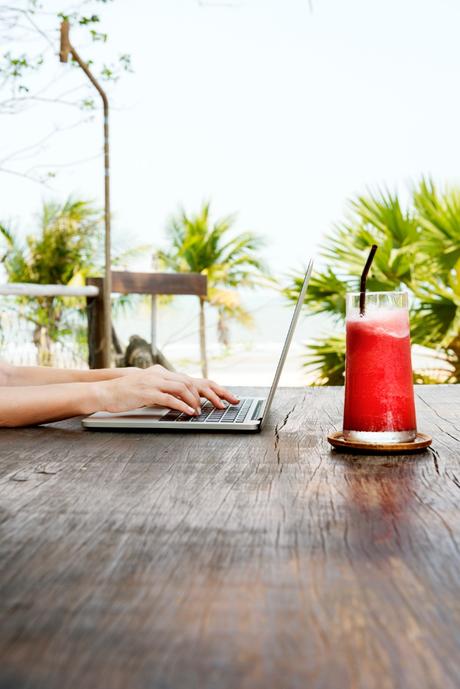The nomadic lifestyle isn't for everyone. Travelling and "working from anywhere" holds much charm for many people. But the truth is that managing a business on the road is the (long-term) path few people. It takes a certain type of person to cope with the physical and mental issues that constant travel brings.
I'm not bashing the nomadic lifestyle. I'm not trying to influence anyone. But I've written about the joy and amazing experiences that digital nomadism offers. I'd be remiss if I failed to point out that you don't need to be constantly moving to be happy. There is another way.
Don't believe the hype
Have you seen those Instagram shots of nomad "influencers" sitting in hammocks and sipping Piña Coladas? It's all fake. They are not working and enjoying the beach at the same time. They're staging the photos for the 'gram. So don't take your laptop to the beach. As James Shramko puts it, "Success is being at the beach without the laptop".
Some of us dream of the hip nomad lifestyle of endless travel with some "work" doing social media posts at the end of the day. Successful nomads don't live this lifestyle. The wannabes and Tai Lopez-types of this world will lead you to believe that they do.
I can give you advice on how to become a digital nomad but it might not be what you need. Don't buy into a lifestyle that's not for you. Don't do it for the label!

Don't do it for the label!
Nomadism is trending. Cubicle slaves want it. Most people can't have it. But this situation is changing, especially since Covid-19 turned the office life upside down. One day, remote working might be the norm. The problem is that we're in the intermediary point between trend and mainstream. People have no idea what it's like to work and travel constantly. But that doesn't stop them wanting to get in on the act.
And that's when our vulnerabilities and naivety can be used against us. Unscrupulous marketers see opportunities for making money whenever ordinary people see a glimpse of a better life. There are countless YouTube videos, Instagram influencers and blog posts (yep, I wrote one) showing you how to be a digital nomad. There's nothing wrong with that. But, as always, when money gets mixed in with people's insecurities, people get hurt.
Wannabes watch videos of people travelling the world, apparently living their best lives (whatever that means). Beach parties, train journeys across the Andes, Yoga in front of the Taj Mahal, massive spreads of breakfast on the terrace with Greek Island background. It's the life. And you only have to work for an hour a day. Even better, buy my course on growing your Facebook Ads Agency and you'll never have to work. [ Note: I don't have a Facebook Ads course ]

Work & Life Imbalance
Balancing work and life (outside of work) is extremely difficult.
Some people pull off a lifestyle of changing locations on an almost daily basis and still manage to get work done. But most people will admit in private that it's devilishly difficult to be productive while travelling.
Try coming off a 12-hour flight, finding a taxi, checking into a hotel and then doing anything productive. I try not to work on those days of travel. It's better to sleep or get outside and walk around a new city. Get over your jet lag and remove some of the FOMO you might have for the new city at the same time!
But skipping a day or two of actual work might have negative consequences for your business or work. Solopreneurs or freelancers, which I'll bet covers 90% nomads, understand this. Clients, customers, and colleagues will put up with your jet lag face and wifi connection problems only so many times.
Being Nomadic: Loneliness & Fleeting Relationships
Ah, another first world problem. Travel the world visiting places you'd never dreamed of in your cubicle job. Do more interesting things every week than most people do in a year. But there's something missing
This life can be lonely. And this is true even for couples.
I believe that the vast majority of people will hate their lives if they have to move location every few days or weeks. It goes against our instincts. We value a familiar place to live, security, and stability. But most of all, we value community. There's plenty of research to suggest that the most important factor for mental health is a strong social network. And I don't mean an online social network. Community is one you build, not one you slot into anonymously or semi-anonymously. Groups and communities on Facebook can slide into a cesspool of polarisation and self-validation. What we need is our own personal network of people we can talk to, touch, and hug. Real friends are worth more than any therapy. They offer more joy and comfort than any life of zipping around the world can.
Tax Issues
"Regular folk" sometimes view digital nomads as tax evaders. Travelling the world and avoiding paying tax is tempting. It's also not a smart way to run your affairs. The days of hiding money in bank accounts are long gone. But nomads can run into problems when they try to do the right thing.
Finding a tax expert who even understands the words " location independent" can be hard. You might find someone who has read a few articles about digital nomadism but you now need to explain why you have 10 credit cards, 5 PayPal accounts, a card for currency transfers, 7 income streams, 12 bank accounts, expenses from everywhere in the world, and multiple addresses. You've now got a whole new set of challenges. How to account for income earned in a country that has a double-taxation agreement with your home country? Where is your official home country? Where is your tax residence? Where should you open a business? How do you start a business in another country? Should you start a business in another country? Is this all worth it?
My point is not to show that being nomadic is a pain in the logistics. But the real mental energy cost in figuring it all out can be stressful and anxiety-inducing. At one point I found myself wondering whether should just earn less so I didn't have to think so much about tax.
Health issues
When you're sick, few things are enjoyable and no amount of money is enough. And there's nothing like an illness to make you long for the comforts of your homeland, doctors you can communicate with, and a family & friends support group around you. This topic is important at any stage of life but even more so as we get older. Most digital nomads are over 30 years old, despite what the media might say.
Removing the distractions of work allows me to be present, to be mindful, and to almost meditate on the experience
Being a Nomad From Time To Time
Find a place to stay and make it your home. Let's call it a home base. A home is important, even if you don't own property, and even if it's "short term". If you're looking to remain a so-called stateless nomad for tax reasons, you can stop looking. This isn't possible anymore and the consequences of not paying tax will bite you in the ass soon one day or another.
U se your built-in digital nomad lifestyle to travel to places that interest you. But don't travel with a plan to get tons of work done at the same time. I feel like this rarely happens. Full-time travel is tough on the body and even tougher on business and relationships.
Working from a sweaty, fly-infested cafe in Africa might sound exciting - and it might make a cool Instagram story - but it's hard to get real work done.
When I need to grow my business, generate income, or solve problems, I don't travel much. Nomadic life takes a back seat. I certainly avoid visiting countries that are not conducive friendly to remote work. Iran is a case in point. Travel to Iran will happen when I have at least 3 weeks free of work responsibilities. After 25 years travelling and more than 5 years as a digital nomad, I can say that it's far more rewarding to take a deep dive when travelling. Immerse yourself in a destination and culture and reap the benefits. Remove the distractions of work will allow you to be present, to be mindful, and to meditate on the experience.
Use the freedom you built into your lifestyle to travel to places that interest you

